Medical offices use EMR software to keep track of their patient’s medical records. Patients need to be able to access their medical records outside of the doctor’s office, which necessitates the adoption of an electronic medical records (EMR) system by healthcare providers.
EHR systems are continually evolving, and they are now more beneficial to doctors and their offices than they have ever been. Continue reading to discover more about EHR and EMR solutions, or use our Product Selection Tool to receive a free shortlist of vendor suggestions tailored to your needs.
What is EMR Software?
Medical practises use electronic medical records (EMR) software to keep track of their patient’s medical information. Patients’ data, including prescriptions, charts, and treatment information, is recorded and organized in the form of digital imprints, and appointment scheduling, compliance tracking, and decision support are all facilitated by EMR systems.
What is the best use for EMR Software?
EMR software allows medical clinics to avoid manual paperwork and save time by digitally collecting patient information. Patients’ personal information, allergies, symptoms, treatment details, and medication history are all recorded electronically using EMR systems, allowing clinicians to safeguard this data against damage or loss.
Top 10 Best EMR Software
AdvancedMD
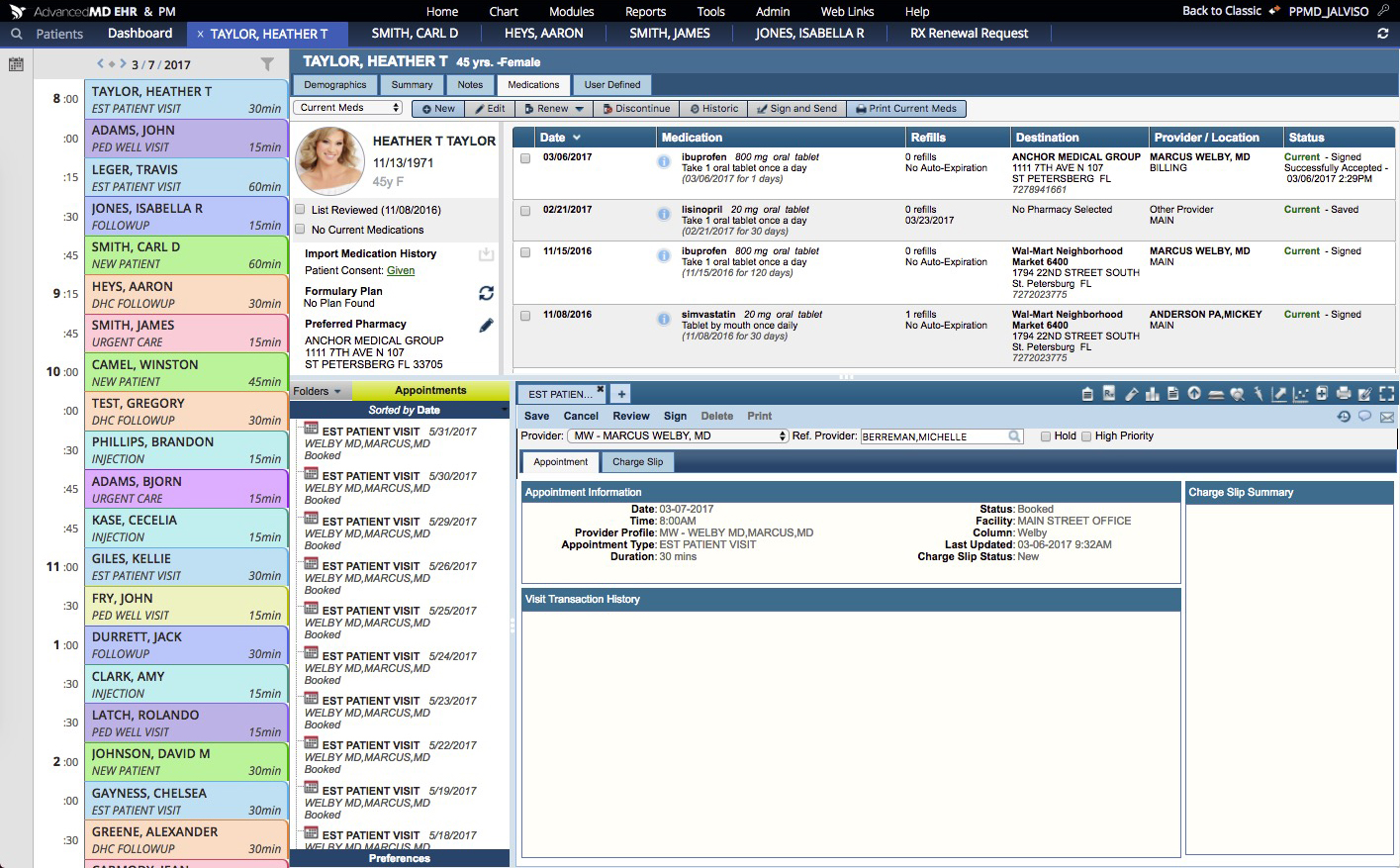
AdvancedMD has you covered, whether you require simple functionality in your EMR. It is adaptable enough to meet the demands of a wide range of practices. The major dashboard provided by AdvancedMD takes some effort to master, but once you do, you’ll be able to perform some incredible things to help your practice run more smoothly.
Pros
- Interface for detailed scheduling
- EMR with scalability for a variety of practice sizes
- There are several characteristics that may be customized.
- Excellent capacity to track prescriptions
Cons
- It takes some practice to understand how to utilize it effectively.
- The cost is a little more than some others.
AthenaHealth
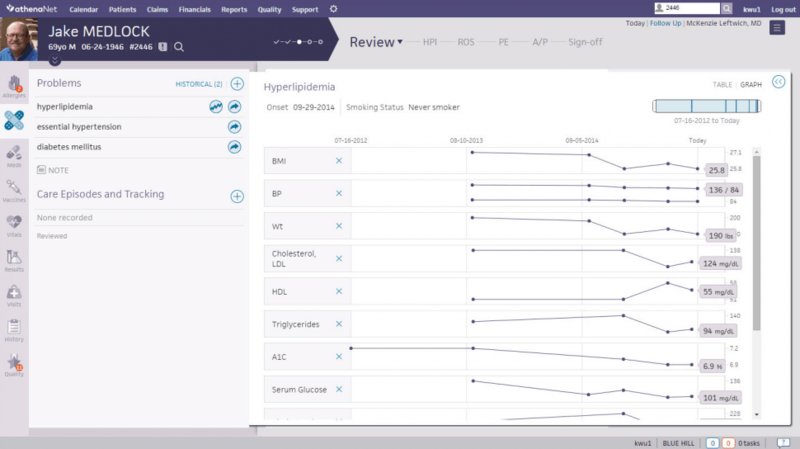
Small and medium-sized practices frequently require an easy-to-use EMR system since they may lack the time or resources to dive deep into a sophisticated piece of software. This is where AthenaHealth comes in. It’s entirely web-based, so it’ll operate in a practice where staff members utilize a range of input devices.
Pros
- It’s quite simple to learn how to use.
- It’s simple to filter and personalize the scheduling features.
- A web-based EMR may be used on a variety of devices.
- Excellent client service
Cons
- Not designed for big practices.
- You’ll need to put in place rigorous access security measures because it’s web-based.
CareCloud
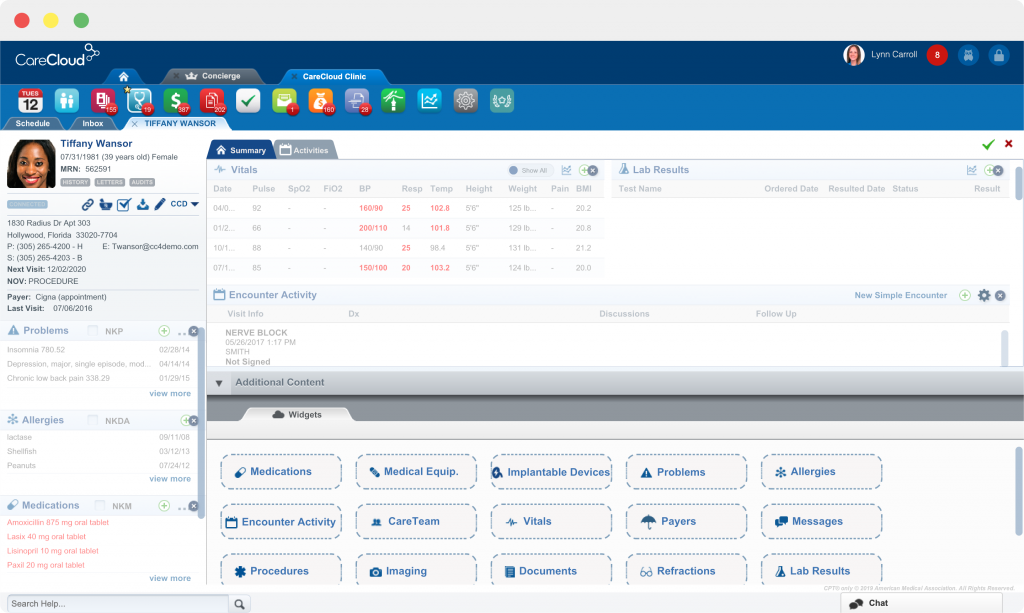
The CareCloud interface allows you to see exactly how the patient moves through your clinic. This aids in the detection of possible bottlenecks, thus improving the efficiency of your processes. Because they’re web-based, you can use them with any input device. The user interface is also quite customizable. That’s ideal for the ever-changing world of regulations and legislation.
Pros
- The new UI is simple to use.
- Excellent for keeping track of the patient flow.
- Pricing is really competitive.
- Adapted on a regular basis to meet new healthcare regulations
Cons
- For bigger practices, it may be too basic.
- Small practices must subscribe to Greenway Health’s Intergy EMR concierge service.
Greenway Health’s Intergy
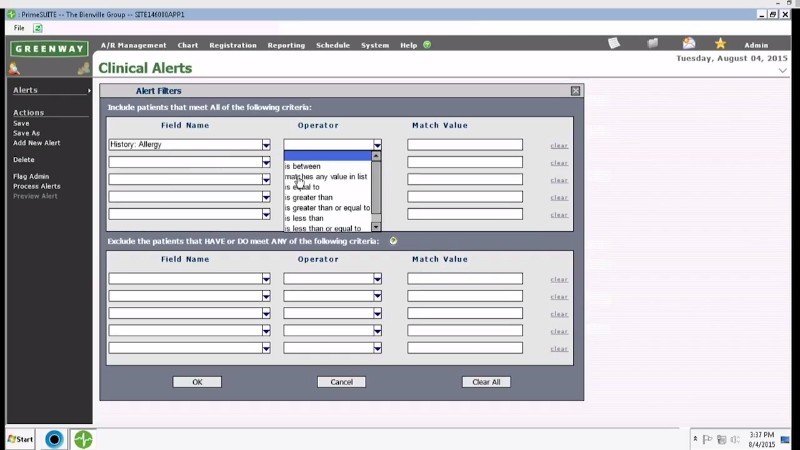
The Intergy from Greenway Health is an extremely adaptable system. Because it’s very adaptable, it’s ideal for large medical offices that deal with a diverse range of situations and patients. It could take some time to understand all of the many components of Intergy, but the effort is well worth it.
Pros
- EMR system with a lot of flexibility
- Excellent customer service and training possibilities, as well as a nice array of shortcuts to expedite work.
- Tiers of pricing that are affordable
Cons
- An update to the interface would be beneficial.
- It will take some time to become acquainted with all of the unique choices.
Kareo EMR

Kareo EMR is really simple to use. Although the interface of this system is a little older than some others, it will still perform well for small and medium-sized practices. Those that work in your clinic will be able to rapidly take up the principles of the EHR, allowing you to get up and running in no time.
Pros
- Designed specifically for tiny practices.
- Very simple to use
- The cost is affordable.
- Good implementation and training assistance
Cons
- The user interface appears to be a little out of date.
- Not designed for big or complicated practices.
NextGen
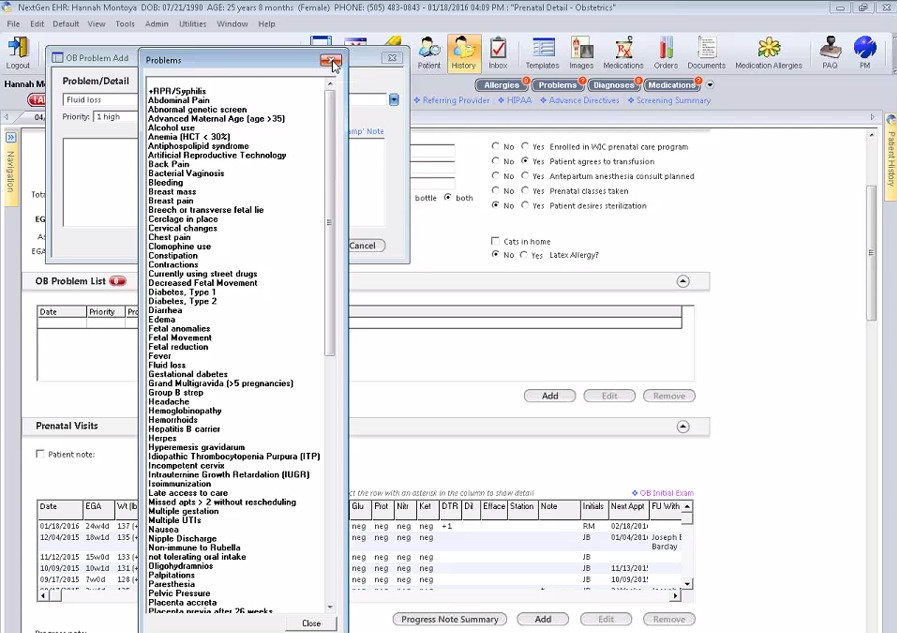
NextGen provides the sort of customer service that small and medium-sized firms require. Although the practice of this size may lack the technical manpower needed to provide training and other services, NextGen’s customer service and training skills are unrivaled. NextGen EHR is also quite adaptable. You’ll be able to customize their service to your practice’s precise requirements.
Pros
- Customer service and training are excellent.
- It’s simple to get started with the system.
- Multiple customization possibilities are available.
- There are several extremely low-cost levels.
Cons
- For big practices, it is insufficiently powerful.
- It takes some time to get to know the intricacies of the system.
Sevocity
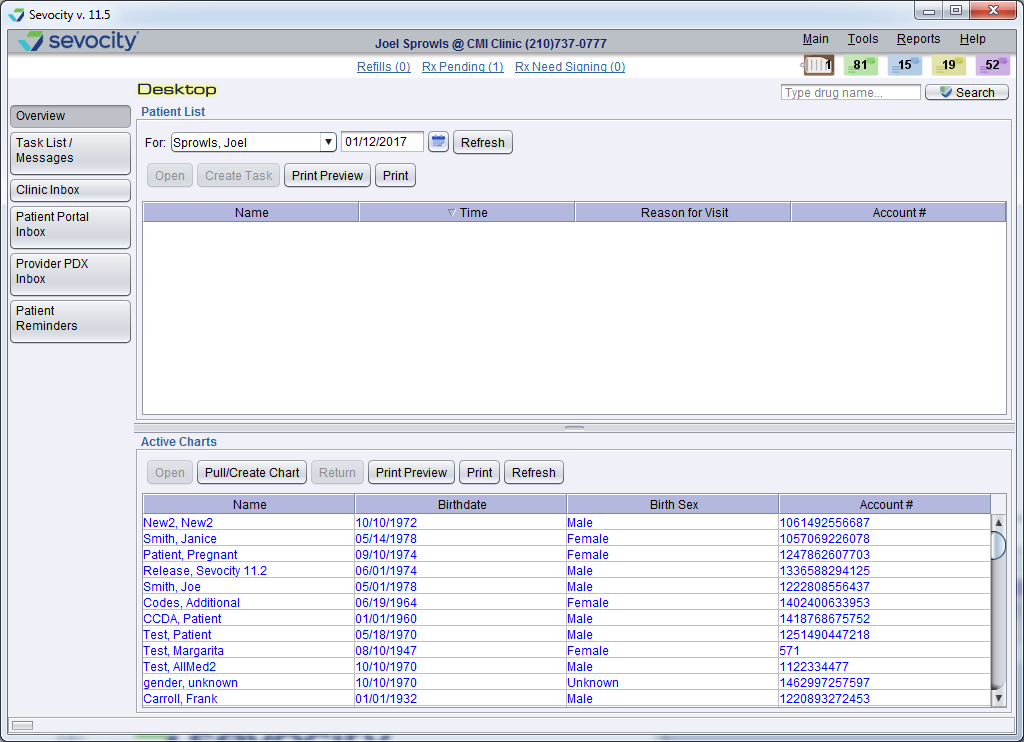
The Sevocity EMR includes a lot of capabilities that are useful for small and mid-sized clinics, but it is unlikely to be powerful enough for bigger operations. This EHR’s interface is incredibly user-friendly, and you may conduct minimal customizations. Customer care representatives are accessible 24 hours a day, 7 days a week.
Pros
- Features of excellent customer service
- At a reasonable price, it’s a win-win situation.
- The features are simple to use.
- It’s especially beneficial for smaller practices.
Cons
- For big practices, there may not be enough personalization.
- There are several training features that are missing.
TheraNest
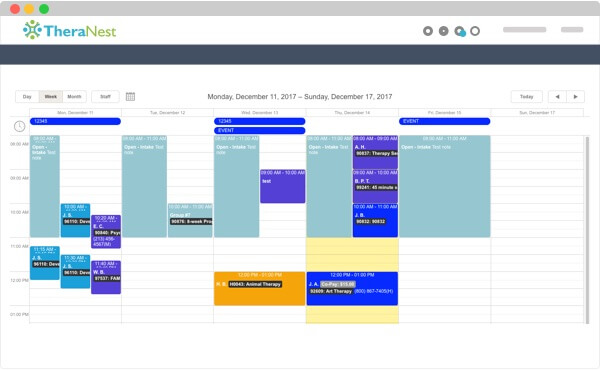
TheraNest is a good alternative for practices that need to be able to access the EMR interface from a variety of devices. They offer two options for accessing TheraNest: you can run it on a standard computer or you can use smartphone apps. It even has a client portal that lets clients set up appointments and send in forms on their own.
Pros
- There’s also a mobile app alternative.
- The entire database is accessible over the internet.
- There’s also a client portal.
- The learning curve is less than that of some other EHRs.
Cons
Certain the price levels appear to be a little costly, and the security procedures required for a totally web-based system may be off-putting to some practitioners.
Centricity
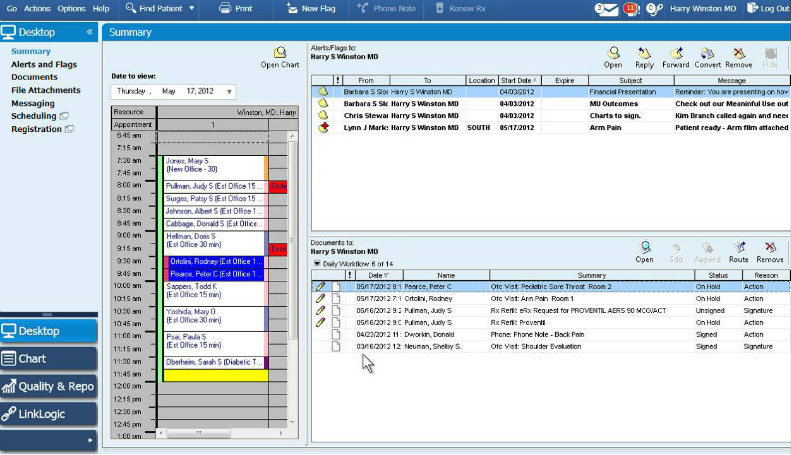
Centricity from Virence Health is an excellent choice for small to medium-sized practices. It contains a number of features that allow smaller practices to track data in a way that a bigger practice has typically been able to accomplish. Centricity also has a mobile app, so medical staff can use it in the way that works best for them.
Pros
- Excellent in every way
- EMR software is simple to use and is ideal for small and medium-sized clinics.
- It also comes with a well-designed mobile app.
Cons
- Its customization capabilities might not be sufficient for large practises.
- The price is a touch on the expensive side.
WebPT
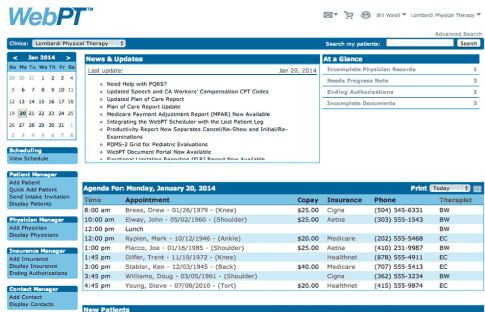
Occupational, speech, and physical therapy are examples of outpatient services. WebPT offers a ready-to-use platform. Because this is a web-based solution, employees at the clinic may use a variety of devices to access it. It has a solid customer service reputation, with help available at all times.
Pros
- Extremely cost-effective
- Designed with outpatient procedures in mind.
- If necessary, mobile device access is included.
- The user interface makes it simple to find the information you want.
Cons
- Some parts of the software place limitations on how data must be entered.
- For inpatient practices, this isn’t going to work as well.
Conclusion
It is critical to safeguard this sensitive information. HIPAA compliance is also important. The best EMR systems protect data while making it available to those who require it. Documentation that is complete and accurate leads to a more effective billing system and less time spent on paperwork. The best EHR systems on the market now include Advanced MD, Athena Health, and CareCloud. To simplify information and enhance patient care, use the reviews in this article.


